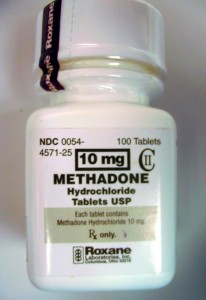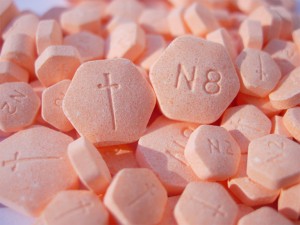Alternatives to Methadone Treatment
 Methadone is an opioid-based medication and, though it can be prescribed for pain management, it is also considered the gold standard in treatment for addiction to heroin and other opiates, like OxyContin, Percodan, and other prescription painkillers here in the United States. Because methadone is an addictive medication itself, many questioned the validity of prescribing a narcotic prescription to treat addiction, but copious amounts of research, anecdotal evidence, and time demonstrated that the medication is an effective tool for the treatment of opiate dependence.
Methadone is an opioid-based medication and, though it can be prescribed for pain management, it is also considered the gold standard in treatment for addiction to heroin and other opiates, like OxyContin, Percodan, and other prescription painkillers here in the United States. Because methadone is an addictive medication itself, many questioned the validity of prescribing a narcotic prescription to treat addiction, but copious amounts of research, anecdotal evidence, and time demonstrated that the medication is an effective tool for the treatment of opiate dependence.
Some benefits of methadone treatment for opiate addiction include:
- The ability to avoid the bulk of intense withdrawal symptoms that generally come with opiate detox
- The ability to immediately begin the therapeutic work that will help the patient move closer to a strong sober foundation
- The ability to wean off the drug slowly, decreasing doses as minimally as 1 milligram at a time, in order to safely avoid relapse
- A controlled substance, the patient guarantees avoidance of the toxins that may be present in heroin.
- Taken in front of a medical professional each day, the patient can also avoid accidental overdose
However, there are drawbacks to the use of methadone in opiate addiction treatment. A Schedule II drug, it is classified as a drug with medical use but it is also:
- Heavily restricted in its prescription and use
- Patients must take their dose daily in the presence of a medical professional, which can be prohibitive for patients who are not living at an inpatient treatment facility or have to be at work during the hours that their methadone clinic is open
- High potential for abuse
- Patients must also comply with other therapeutic requirements.
- Patients may still overdose on opiates while taking the drug
Many patients feel that if they can’t stay sober successfully through maintenance treatment, there is no hope for them. The fact is that there are a number of different options in opiate detox and addiction treatment that do not include methadone – even some that do not include medication at all.
These options include:
- Buprenorphine
- Orlaam (or LAAM)
- Heroin (not available in the United States)
- Cold turkey detox
- Medically supervised detox
If your loved one is living with an opiate dependence, a supervised detox with or without pharmacological assistance is the first step. Contact us at The Orchid today to speak with a counselor about your family member’s needs for treatment and help them begin the enrollment process.
Buprenorphine
 Buprenorphine is the only drug on the market that is approved solely for the purpose of addiction treatment and has no other medical uses. It is also the newest medication to be utilized in opiate addiction treatment.
Buprenorphine is the only drug on the market that is approved solely for the purpose of addiction treatment and has no other medical uses. It is also the newest medication to be utilized in opiate addiction treatment.
Medscape reported on a study published in the American Journal of Health-System Pharmacists that found that the use of buprenorphine, also known as Subutex, and a buprenorphine-naloxone mix called Suboxone in opiate addiction treatment is just as effective as methadone in helping patients to avoid the dangers of active drug abuse. Some of the benefits of buprenorphine in opiate rehab include:
- The ability of patients to use the drug on an outpatient basis, which allows them to continue to use the drug after they leave an inpatient program and thus avoid a number of temptations associated with continually engaging with a methadone clinic
- Because naloxone is an opiate agonist, it can help limit abuse or diversion of the drug
- Provides some antidepressant effects, which can be helpful in early recovery
- No requirement to take the medication in front of a medical professional daily, which allows for a flexibility of schedule for beginning work or maintaining a job
- No overdoses on buprenorphine have been reported
- Patients who start with methadone and begin to lower their dose over time can switch to buprenorphine during the outpatient transition process in recovery
Buprenorphine is not an effective choice for every patient in recovery from dependence upon heroin and/or prescription painkillers. For example:
- Patients who are using a high dose of heroin when they quit will not be able to take buprenorphine. It is only appropriate for patients taking less than 25 to 30 milligrams of heroin a day.
- Not all patients do well with the loose structure provided by an outpatient, medication-only detox.
- There have been cases of buprenorphine abuse and diversion since its release.
- Doctors must be certified in the dispensation of buprenorphine and many doctors refuse to get this certification because they do not want to associate themselves with drug addiction treatment.
Like methadone, it’s important to enroll in an intensive psychotherapeutic program – inpatient or outpatient – while undergoing buprenorphine treatment. The medication only treats the physical addiction and does not address psychological issues or the triggers to get high that patients usually experience, especially in early recovery.
Treatment Options
Orlaam
Orlaam, or levomethadyl acetate HC, is a medication that is used in the treatment of opiate dependence, but it is generally considered a last resort. There are a number of problematic issues associated with the use of Orlaam that make use of the drug a comparatively dangerous choice in opiate addiction treatment.
For example, the US Food and Drug Administration (FDA) issued a report stating that Orlaam labeling must have a strong warning about the cardiovascular risks of using the drug due to the fact that 10 patients reported experiencing extreme heart rhythm change after using the medication. The issues with cardiovascular health caused by use of the drug were deemed so severe by the European Union that they removed the drug from the market in 2001 and it is not approved for use in Canada. Patients are advised to seriously weigh the pros and cons of use of the drug and to make sure that they are medically monitored very closely while undergoing Orlaam treatment in order to manage any serious side effects.
Pure Heroin
The Wall Street Journal reports that a study out of Canada supports the idea that pure, medical-grade heroin may be an effective alternative to methadone treatment in the care of those who are living with a dependence upon heroin. The goal of using heroin treatment is to help long-term addicts who were not helped by methadone and other treatment options to continue to see a doctor regularly, stop criminal behavior, and potentially move closer to abstinence. Those who undergo heroin treatment rarely do so with the goal of weaning off the medication. Rather, most who utilize this treatment do so with the intention of managing their addiction so that they maintain optimum health and avoid criminal behavior, overdose, and other issues related to using heroin purchased on the street.
In the study referenced in the report, one group of addicts was given methadone and another group was given two injections of pharmaceutical-grade heroin per day. The rate of use of illicit drugs in addition to the treatment drug fell by 67 percent among the participants given heroin treatment but only 48 percent among those given methadone. Additionally, about 88 percent of the participants given heroin remained in treatment for the entire study period as compared to 54 percent of the methadone group.
The use of heroin to treat heroin addiction seems counterintuitive and the risks of diversion as well as the benefits of treatment will require far more study and investigation before there will even be a possibility of its use in the United States. Heroin is currently classified as a Schedule I drug, which means it is not legal for any use, has a high potential for abuse, and has no medical value. In order to reclassify the drug, a great deal of research, lobbying, and legislative change will have to occur. There is currently little to no movement on that front, thus it is unlikely to become an option here in the US any time soon.
Cold Turkey Detox
For some, avoiding use of any pharmacological methods is the detox of choice when it’s time to stop using heroin and other opioid-based drugs. There are a number of benefits, but there are drawbacks as well, and it is never advised that patients attempt a cold turkey detox off a high-dose opiate addiction at home alone. Rather, medical supervision is necessary in order to ensure that withdrawal symptoms do not cause medical complications.
The major benefit of a cold turkey detox is that it often provides a faster detox than with medication. It also helps with the processing of literally detoxing the body of all toxins related to drug abuse rather than simply replacing heroin with more chemicals. But while quickly becoming free of heroin addiction is a huge benefit to those who are ready to move forward in life, there are a number of issues to consider, including:
- Intense withdrawal symptoms that can feel like an extreme version of the flu
- Withdrawal symptoms can linger for a couple of weeks
- Medical issues can develop if there are underlying disorders
- Patients usually must wait for the bulk of symptoms to pass before they can begin psychotherapeutic treatment.
- Few patients can maintain a job or continue with their education while going through opiate detox without pharmacological assistance.
Medically Supervised Detox
A medically supervised detox is recommended no matter what type of detox is chosen for opiate rehab. However, there is a middle ground between a completely medication-free detox and a maintenance detox that utilizes methadone, buprenorphine or another medication. A medically supervised detox provides the safety that comes with medical supervision throughout the detox experience but also allows the patient to seek pharmacological assistance in dealing with the resulting symptoms but using only medications that are non-addictive. For example, if one of the symptoms is insomnia, then the doctor may prescribe a non-addictive sleep aid to assist the patient in getting their rest. If one of the withdrawal symptoms is constipation or nausea, then other medications may be appropriate. In this way, patients can enjoy the benefit of a shortened detox as compared to pharmacological maintenance but mitigate the discomfort associated with withdrawal symptoms.
Which Opiate Detox Is Right for Your Loved One? Call The Orchid Today
No matter which type of opiate detox you choose, it’s important to recognize that detoxification is not a comprehensive treatment for opiate addiction. Detox only addresses the physical dependence upon the drug; it does not address the environmental, emotional and psychological issues that drive an addiction. Without intensive psychotherapeutic treatment, no one will be able to remain clean and sober for long.
Contact us today to learn more about your loved one’s options in treatment here at The Orchid and help her to take the first step toward a new life without drug addiction.
Further Reading